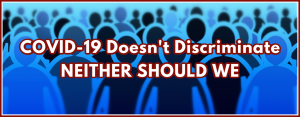Dear friends and neighbors,
We know that everyone is very concerned with the impacts of the COVID-19 outbreak on our families and communities. House Democrats have put together a web page with a regularly updated list of resources for individuals, families, workers, and businesses. We will continue to keep you updated as we receive more information.
Below please find information on resources for parents and students, for meals and child care, support for workers and business, and healthcare access.
Budget Response to COVID-19
Over the last several weeks of the legislative session, it became clear that we would need a significant response to the outbreak of COVID-19 in Washington State. We passed legislation transferring $200 million from the state’s Budget Stabilization Account to help respond to the outbreak of COVID-19 out of both the House and Senate unanimously. On Wednesday, the Governor signed that bill into law and funds are now being distributed to our agencies and partners who are on the frontline of COVID-19 response. From that amount, $175 million is slated for helping to slow the spread of the virus and for treatment of those infected. The remaining $25 million is for assistance to businesses forced to temporarily lay off employees as a result of the outbreak.
Support for Parents and Students During School Closures
 Schools are the cornerstones of our community. Last week, Governor Jay Inslee and Superintendent of Public Instruction Chris Reykdal directed all schools statewide to close until April 27 at the earliest. We know that school closures will have a serious impact on Washington’s families. Here are some resources for families affected by this disruption.
Schools are the cornerstones of our community. Last week, Governor Jay Inslee and Superintendent of Public Instruction Chris Reykdal directed all schools statewide to close until April 27 at the earliest. We know that school closures will have a serious impact on Washington’s families. Here are some resources for families affected by this disruption.
- OSPI will continue to be your best resource for updated information. Check their website or follow them on Twitter and Facebook.
- Parents of students who receive free or reduced-price school meals should contact their school district about meal distribution.
- Frequently Asked Questions about school closures.
- Tips for talking to your children about school closures.
- Remote learning resources for students and families.
Finding Child Care during the COVID-19 Crisis
While the governor has closed schools statewide until April 27 at the earliest, child care facilities are currently allowed to remain open. Child care settings often have far fewer children than in a schools so providers can more easily ensure social distancing and proper hygiene. The Department of Children, Youth and Families is working in lockstep with local partners to ensure child care providers have the necessary guidance to offer safe and supportive care during the COVID-19 crisis.
If you are looking for child care please see the following resources:
- During the state of emergency Child Care Aware, an independent organization that provides information and support for families seeking child care, is keeping an update to date list of local community options for child care. You can call them at 1-800-446-1114 or use their online child care referral search to look for options.
- Another option is to utilize the Family, Friends & Neighbor program via their website or by calling 1-866-482-4325.
If you have a kid at home who’s too old for child care and are looking for support, please refer to this list of resources for caring for kids at home or call your local school district. OSPI has asked superintendents to provide child care to school-age children, at no cost, in families who are in professions that are directly responding to the COVID-19 crisis. Check with your local school district to see what options are available for children of parents who are in the medical field or first responders. Districts that chose to provide child care for school-age children have been advised to take every measure possible to keep students safe. These include social distancing, consistent hand washing, sending students home if they’re sick, and routinely disinfecting surfaces.
Feeding families during the COVID-19 Crisis
The governor has closed restaurants for the next two weeks, but not because food is the risk. There are plenty of ways to continue to access safe and healthy food, and extra help is available for families that need support getting food on the table.
Grocery stores, gas stations and convenience stores remain open. As the governor stated on Monday, there is no need to stockpile. Our supply chain remains strong. Practice social distancing and use good hygiene when making essential trips for groceries.
Order takeout and delivery while practicing social distancing. Again, the governor has closed restaurants for the next two weeks to increase social distancing, not because food is the risk. You can still support small businesses by ordering takeout and delivery. Make sure to maintain good social distancing and hygiene while doing so.
Assistance with buying food. If the COVID-19 crisis is creating extra strain on your household budget, you can apply for assistance through various state programs at https://www.washingtonconnection.org/home/.
Free school meals in some school districts. School districts are stepping up to continue to provide free school breakfasts and lunches. Check with your local school district to see if they are providing free meals for kids.
Food banks remain open. Food banks continue to provide assistance to families and are instituting increased social distancing and hygiene practices. For any questions about hours or practices, please contact your local food bank directly. If you are healthy and able to give time, consider volunteering.
For seniors and people with disabilities: Several types of local organizations offer home delivery food or meal services for seniors and people with disabilities – as possible, they are expanding home delivery to people with underlying health conditions that make them at risk during this COVID-19 emergency. Check your local food bank, senior center, or Meals on Wheels program to find out if their home delivery services available.
Cooking at home. For those cooking at home, handle food with the same care that you usually would. Wash your hands. Only handle food when healthy. People who are coughing, feverish, short of breath, or otherwise sick should stay out of the kitchen.
Support for Workers & Businesses
 The governor’s bold move to mandate a two-week closure of restaurants, bars, and entertainment and recreational facilities, as well as limiting gatherings to 50 people, will help slow down the spread of coronavirus. However, workers and business owners are being impacted and are looking for answers as they wonder how they will get their families through this necessary shutdown.
The governor’s bold move to mandate a two-week closure of restaurants, bars, and entertainment and recreational facilities, as well as limiting gatherings to 50 people, will help slow down the spread of coronavirus. However, workers and business owners are being impacted and are looking for answers as they wonder how they will get their families through this necessary shutdown.
State agencies have adopted emergency rules and developed comprehensive websites to help relieve the burden of temporary layoffs, isolation and quarantine for workers and businesses. Please keep in mind that the content in the links below will likely be updated as this situation continues unfolding, so check these sites often for the latest information.
For Workers:
- The Employment Security Department has resources on paid sick leave, paid family and medical leave, unemployment benefits, and more. Check out this easy reference chart on scenarios and benefits.
- The Washington State Department of Financial Institutions has information available on mortgage payments, rent payments, student loan deferments, short term and emergency loans, utility payments, and more.
For Businesses:
- The Employment Security Department has information on what resources are available to help businesses keep employees, and information about tax filing lenience.
- Governor Inslee’s website has a list of resources on:
- How to apply for federal Small Business Administration loans.
- How to request tax filing extensions or penalty waivers from the Dept. of Revenue.
- Where to go for support from the Dept. of Commerce Export Assistance Team.
- The Office of the Insurance Commissioner has a page on business insurance information, including one answering questions on event cancellation insurance.
Healthcare, insurance, long-term care during this crisis
During this unprecedented public health emergency, it is critical that important health care information is accessible for everyone. Many state agencies and health insurers are working to be responsive to the needs of Washingtonians.
The Health Benefit Exchange has, in response to the potential growth of COVID-19 cases, opened a special enrollment period through April 8, 2020 to qualified individuals who are uninsured. Visit their website here to find out if you qualify and how to enroll. The Office of the Insurance Commissioner also also has a list of frequently asked questions about health insurance and COVID-19.
Social distancing: A how to guide
Social distancing is one of the most effective ways to slow the spread of COVID-19 as the virus is transferred from person to person. Even if you do not show signs on the virus, you could be a carrier and should practice social distancing whenever possible.
Social distancing guidelines include:
- Staying home whenever possible, especially when you or anyone in your household is sick.
- Maintaining six feet of space between individuals. It’s okay to get fresh air, walk the dog, buy groceries and pick up medications – just maintain six feet of space.
- Eliminating nonessential trips outside the home. Use telecommute options and avoid public transportation whenever possible. Trips to the grocery store and pharmacy are okay.
- Minimizing contact with people, especially nonessential travel and visits with people over the age of 60. Seniors and people with compromised immune systems should stay home whenever possible.
- Rescheduling nonessential social gatherings and travel. There is a current statewide emergency ban on gatherings of more than 50 people and sit-in options at restaurants and bars. Delivery and take-out options are still available.
- Keeping in contact with loved ones remotely.
Coronavirus is contagious, but so is compassion
 We are grateful and proud to live in a state that values diversity. While COVID-19 is affecting the way all of us lead our daily lives as we practice better hygiene and social distancing, some of Washington’s residents are also dealing with discrimination, prejudice, and racism.
We are grateful and proud to live in a state that values diversity. While COVID-19 is affecting the way all of us lead our daily lives as we practice better hygiene and social distancing, some of Washington’s residents are also dealing with discrimination, prejudice, and racism.
Fear and anxiety from not having the facts about this virus has led to social stigma — discrimination against a group of people, a place, or a nation. Stigma hurts everyone and often allows myth and rumor to gain traction.
Rely on trusted resources from the Department of Health or Centers for Disease Control to get the facts about COVID-19. You can also prevent and respond to stigma with these resources.
We can all fight stigma by:
- Being compassionate and offering support to impacted communities.
- Learning and sharing the facts on how the virus spreads.
- Stressing that a person’s ethnicity, language or association with a country or region is not a risk factor for coronavirus.
Thank you to our healthcare workers, first responders, and small businesses who are giving their all to keep our community healthy. This crisis is demanding new and challenging ways of supporting each other. We remain your neighbors and partners in rising to that challenge.
Your representatives in Olympia,


Representative Tana Senn Representative My-Linh Thai
